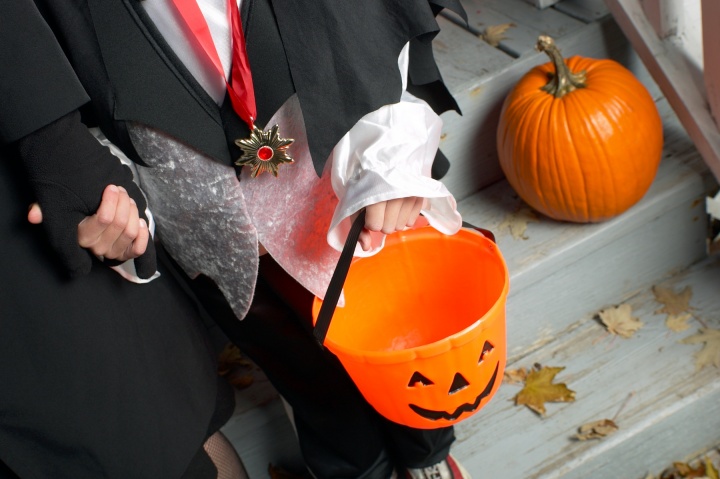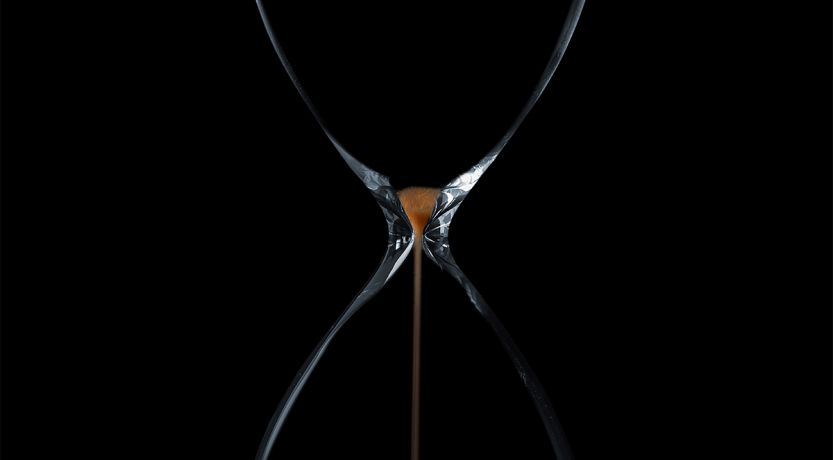.
Should Christians Celebrate Halloween?
Halloween is a major holiday in the Western world for people of various backgrounds. Can Halloween celebrations be reconciled with a Christian worldview and lifestyle? The Bible holds the answer.

Photos.com
Does Halloween serves a positive Christian purpose?
Tuesday night millions of children around the nation will be donning costumes, ringing doorbells and uttering the traditional "trick or treat" Halloween greeting. Most people consider this a harmless, fun activity for children. Others condemn the entire occasion because of the pagan origin of the day and connect it with demonism and the occult.
An article from a prominent Christian magazine suggested that "Christians should embrace the 'devilish' holiday with gusto—and laughter." The author suggests that Halloween presents us with an opportunity to "mock" and "laugh at" Satan and "the forces of evil."
A local pastor, writing wistfully of his past childhood Halloween celebration, said, "I enjoyed being a devil." He asserted that "a child doesn’t think of a red devil as an enemy of God or the apostle of hate and destruction." He went on to defend wearing costumes as merely superficial, and suggested that opposition to celebrating Halloween stems from lack of confidence in Christian beliefs.
Really only harmless fun?
Wait a minute! Is it unchristian for parents not to want their children to dress up as the Devil? Or does Satan the Devil even exist? According to a recent Barna survey, nearly 50 percent of professing Christians do not believe that Satan is a living being. For these folks, the whole question must be a moot point. But perhaps the rest of us ought to reconsider our perspective regarding Halloween.
Would anyone dare to suggest applying this reasoning to Hitler? Would wearing Hitler masks and swastikas and dressing like the skeletal remains of his victims be an appropriate way to "laugh at" Hitler and "mock" the diabolical evils of Nazism?
Is Satan a laughing matter? Does God want our children to associate fun and treats with the forces of evil?
I am not implying that a child who puts on a Halloween mask is dabbling in the occult or is in danger of demon possession. I am simply questioning the suggestion that Halloween serves a positive Christian purpose.
According to Deuteronomy 12:31-32 God does not approve of recycling, reconstituting and relabeling pagan customs to celebrate Christian events.
Carnal holidays trumped by God's Holy Days
My wife and I just finished celebrating eight fun-filled days of the Feast of Tabernacles with more than 700 men, women and children here in Central Oregon. I so much wish all of Christianity could share the joy of this meaningful occasion. Here is a God-ordained festival that was observed by Jesus, Paul and the apostolic Church and is still celebrated today by many Christians. It is one of seven annual Holy Days that foreshadow future events in God's plan (Colossians 2:16-17) rather than focusing on the powers of darkness that form the legacy of Halloween.
Anyone who dares express objections to Halloween has two strikes against him: 1. It is fun for the kids, and 2. It is a long-standing, firmly entrenched custom in our culture.
But the Feast of Tabernacles has Halloween beat in both categories: 1. It is fun for kids and the whole family and is eight days long, and 2. It was established thousands of years ago by God Himself. And most importantly, it and all of Holy Days of the Bible teach valuable lessons about the plan of God.” From: https://www.ucg.org/beyond-today/blogs/should-christians-celebrate-halloween
_________
Is That True?
“Occasionally in life you come across something that goes so contrary to your beliefs that you exclaim, “Is that true?!”
Growing up, I became familiar with the concept of “pagan” or “paganism.” These were pejorative terms that were used to describe practices which were steeped in the worship of a different god and in opposition to Christianity.
Even as a child, when I first learned that Easter and Christmas had their origins in pagan customs, I avoided celebrating these days. Anything “pagan” was clearly something to be avoided; but as I quickly learned, not everyone agreed with that idea.
Over the years, the term “pagan” has increasingly taken on a more benign meaning. Take, for example, Halloween, which comes up in a couple of days. If you do even a cursory search on the Internet, you will find that Halloween is a celebration praised by those who profess witchcraft as their religious preference.
There is actually a church for witches that provides a list of ways to celebrate Easter, Halloween and Christmas as primary days of worship for pagans. They refer to them as Ostara, goddess of the spring and the beginning of life; the Festival of the Dead, which we call Halloween; and the Yule festival, which we call Christmas. These three festivals have “pagan” stamped all over them, so how is it that more than a billion people professing Christianity also celebrate them each year?
According to its pagan origins, the evening of Oct. 31 is when the veil between the world of the living and the world of the dead is at its thinnest level. Nov. 1 is the first day of the Celtic new year and the day set aside for all saints in the Catholic religion.
Oct. 31, Halloween, is a celebration of this crossover between the world of the dead and the world of the living. It is celebrated by people dressing up in costume to commemorate those who are called the living dead—goblins, ghosts and ghouls. Some try to Christianize the celebration by using the term “hallowed” or holy evening. But it is a vain attempt to add Christianity to something that is clearly pagan.
Isn’t it time we looked at our lives and asked some basic questions about what we are doing? Whenever you see a celebration that isn’t found in the Bible, yet is proclaimed to be Christian, shouldn’t you ask, “Is that true?” After all, isn’t Christianity supposed to be based on truth?
The truth of the matter is that Easter, Christmas and Halloween are not found in the Bible. They originate in pagan celebrations. They were adopted and integrated into mainstream Christianity centuries ago.
Can you really be a Christian and embrace pagan rituals? Isn’t this in conflict with the first two of the 10 Commandments, which are against worshipping other gods—the goddess of spring, the sun god and, oh yes, let’s not forget the god of the underworld, who is being honored this week on Halloween?
We live in a world of lies and distortions of fact. Don’t just follow customs that are attractive! Ask questions; and whenever you’re presented with a celebration that is called Christian, never forget to ask, “Is that true?” From: https://lifehopeandtruth.com/speaking-of/is-that-true/
_________
I'm sure you all have friends who are asking questions, you can send them this :
1)Before the modern state of Israel there was the British mandate, Not a Palestinian state .
2) Before the British mandate there was the ottoman empire, Not a Palestinian state .
3) Before the ottoman empire there was the Islamic mamluk sultanate of Egypt, Not a Palestinian state .
4) Before the Islamic mamluk sultanate of Egypt there was the ayyubid dynasty, Not a Palestinian state . Godfrey of bouillon conquered it in 1099.
5) Before the ayyubid dynasty there was the Christian kingdom of Jerusalem, Not a Palestinian state .
6) Before the Christian kingdom of Jerusalem there was the Fatimid caliphate, Not a Palestinian state .
7) Before the Fatimid caliphate there was the byzantine empire, Not a Palestinian state .
8) Before the byzantine empire there was the Roman empire, Not a Palestinian state .
9) Before the Roman empire there was the hasmonean dynasty, Not a Palestinian state .
10)Before the hasmonean dynasty there was the Seleucid empire,Not a Palestinian state .
11) Before the Seleucid empire there was the empire of Alexander the 3rd of Macedon, Not a Palestinian state .
12) Before the empire of Alexander the 3rd of Macedon there was the Persian empire, Not a Palestinian state .
13) Before the Persian empire there was the Babylonian empire, Not a Palestinian state .
14) Before the Babylonian empire there was the kingdoms of Israel and Judea, Not a Palestinian state .
15) Before the kingdoms of Israel and Judea there was the kingdom of Israel, Not a Palestinian state .
16) Before the kingdom of Israel there was the theocracy of the 12 tribes of Israel, Not a Palestinian state .
17) Before the theocracy of the 12 tribes of Israel there was the individual state of Canaan, Not a Palestinian state .
In fact in this corner of the earth there was everything but a Palestinian state!
Origins @voiceofisrael
_________
Hospitals Profit on Junk Food
Transcript of video at: https://nutritionfacts.org/video/hospitals-profit-on-junk-food/
Below is an approximation of this video’s audio content. To see any graphs, charts, graphics, images, and quotes to which Dr. Greger may be referring, watch the above video.
“Why is hospital food so unhealthy?
Put in stark terms, cardiovascular disease claims one American life every 39 seconds”; and for most heart attack deaths, you just keel over. “Sudden cardiac death is the first manifestation of coronary heart disease for the majority of individuals, particularly among women.” So, for many of these sudden death victims, their first indication of the presence of heart disease was their demise. They didn’t even know they had heart disease! That’s why an ounce of prevention is worth way more than a pound of cure, because there is no cure for dead.
But that’s why the prevention of sudden cardiac death remains such a major public health challenge, because most people don’t even know they’re at risk. But we’ve known for over a half century, when we first started autopsying young servicemen who died in the Korean war, that coronary artery disease begins in our youth even among young children. So, business as usual is simply “not going to yield the improvements necessary to radically improve the cardiovascular health of the United States.”
But the good news is “a low-risk lifestyle (not smoking, exercising regularly, having a prudent diet, and maintaining a healthy weight)” may be able to wipe out the vast majority of risk for sudden cardiac death. So, “the time is now long overdue to start aggressive preventive cardiovascular disease programs in our schools, our homes, and our worksites.” How about starting in our hospitals?
A significant percentage of hospitals surveyed had fast food restaurants inside them, with Krispy Kreme topping the list. Brilliant marketing, given that families surveyed in hospitals with McDonald’s were twice as likely to think McDonald’s was healthy—after all, they let it in a hospital. But what about food served in hospital cafeterias themselves? Are they much better? 384 entrees were analyzed at 14 children’s hospitals in California, and only 7 percent could be classified as healthy. And just in case someone accidentally picked the rare healthy option, 81 percent of eating venues in children’s hospitals made sure to have junky impulse buys like ice cream, cookies, and candy near the checkout register. And 38 percent had signs that explicitly encouraged unhealthy eating. Why would they do that?
If you ask hospital cafeteria managers that exact question: “Why they don’t tend to follow nutrition standards?” “Why nutrition is not a top priority?” It’s the same answer why unhealthy food is sold anywhere else—the pressure to generate profit. “Increased emphasis [is being] placed on running a hospital foodservice department as a profit center,” a bigger and bigger profit center. It’s such a metaphor for our sickness-care system in general, where healthy treat-the-cause approaches are eclipsed by the pills and procedures that bring in the most money.
Well, what do you expect from the private sector? But public hospitals don’t seem much better. A 2019 analysis of veterans’ hospitals found that “all VA hospitals contain vending machines providing a majority of soda, candy, and junk foods that directly conflict with” our government’s own healthy food choice recommendations such that, ironically, “hospital visits could theoretically promote worse health.” This raises the question why any soda or candy machines are available at our VA hospitals? “Are we trading the health of our veterans for profits?”
Maybe it’s time to ban junk food on hospital premises. “On daily rounds it is appalling to see patients…gorging on [potato chips, candy, and soda]—the very food[s] that may have contributed to their admission in the first place”—obscene to see fast food franchises on site, legitimizing “the acceptability and consumption of such foods in the daily diet.” “The obesity epidemic represents a public health crisis, but it is a public health scandal that by legitimizing junk food, hospitals have themselves become a risk factor for diet-related disease.” Maybe “it’s time to stop selling sickness in the hospital….” What message do residents receive when they are fed pizza and soda pop at grand rounds on obesity? We need a healthcare system with “more Hippocrates and less hypocrisy.” From: https://nutritionfacts.org/video/hospitals-profit-on-junk-food/
_________

 “Many believe the world will go on indefinitely as it always has, but what does the Bible say? Will there be a set of last days? When will the last days be?
“Many believe the world will go on indefinitely as it always has, but what does the Bible say? Will there be a set of last days? When will the last days be?
 “The conflict between the Israelis and the Palestinians appears to be unending. Will real, lasting peace between these two peoples ever be achieved?
“The conflict between the Israelis and the Palestinians appears to be unending. Will real, lasting peace between these two peoples ever be achieved? Elke Karin Lugert/Unsplash
Elke Karin Lugert/Unsplash












